Cryptography Techniques: Overview, Applications, and Future Trends
VerifiedAdded on 2021/05/31
|8
|3543
|84
Report
AI Summary
This report delves into the realm of cryptography, a crucial technology for securing data transmitted over networks. It begins with an overview of cryptography, emphasizing its role in ensuring data confidentiality and integrity. The report then explores the different types of cryptography, including symmetric, asymmetric, and hash functions, highlighting their strengths and weaknesses. It further examines the applications of cryptography across various sectors, such as online transactions, data storage, and digital signatures. The report also presents a literature review, discussing the challenges associated with cryptography, such as interruption, interception, key management, and scalability. Finally, it concludes by discussing the future of cryptography, including advancements like elliptic curve cryptography and quantum computation, emphasizing the growing importance of cryptography in a world with increasing cyber threats. The report also touches on classical cryptographic algorithm techniques like secret key cryptography, public key cryptography, and hash functions.
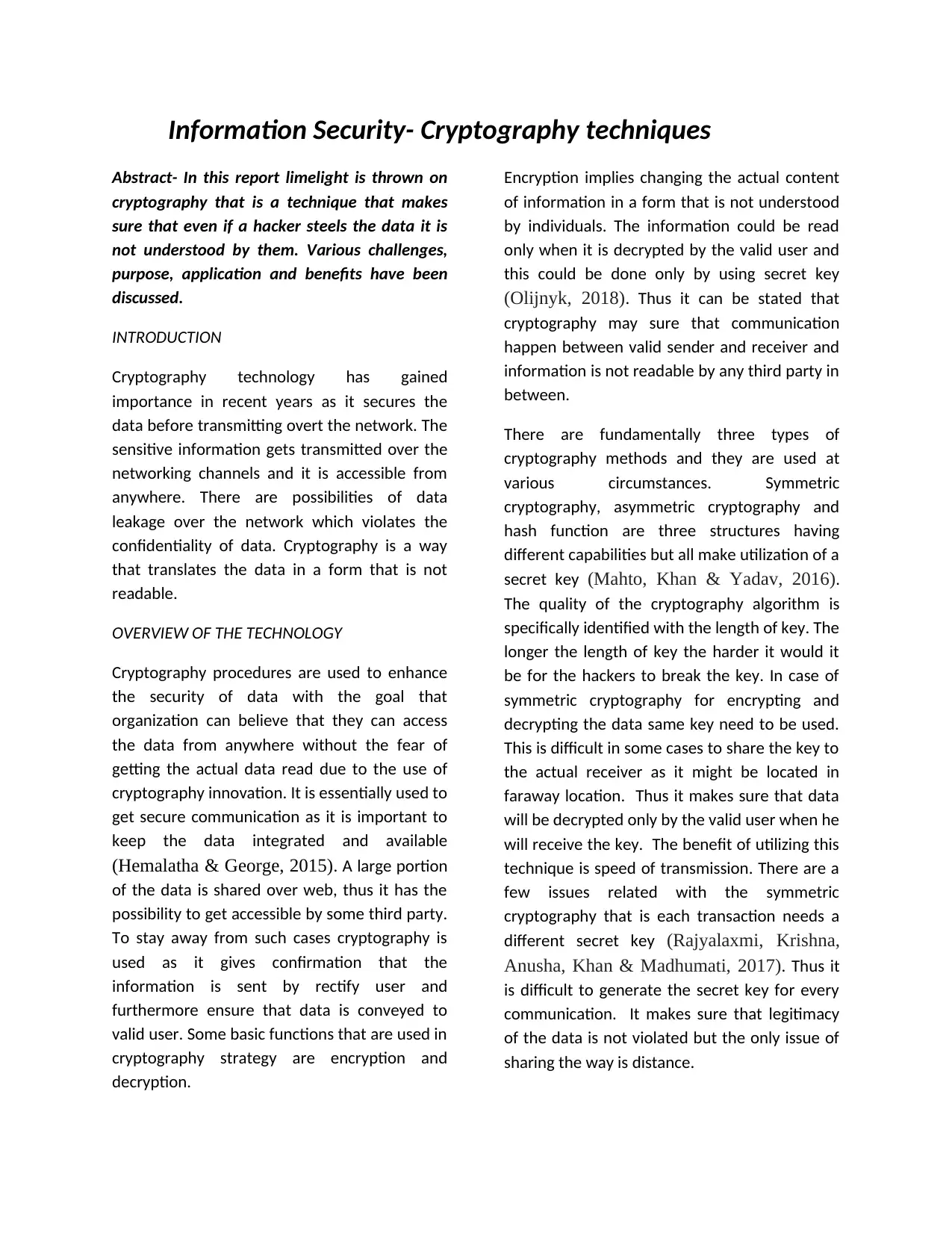
Information Security- Cryptography techniques
Abstract- In this report limelight is thrown on
cryptography that is a technique that makes
sure that even if a hacker steels the data it is
not understood by them. Various challenges,
purpose, application and benefits have been
discussed.
INTRODUCTION
Cryptography technology has gained
importance in recent years as it secures the
data before transmitting overt the network. The
sensitive information gets transmitted over the
networking channels and it is accessible from
anywhere. There are possibilities of data
leakage over the network which violates the
confidentiality of data. Cryptography is a way
that translates the data in a form that is not
readable.
OVERVIEW OF THE TECHNOLOGY
Cryptography procedures are used to enhance
the security of data with the goal that
organization can believe that they can access
the data from anywhere without the fear of
getting the actual data read due to the use of
cryptography innovation. It is essentially used to
get secure communication as it is important to
keep the data integrated and available
(Hemalatha & George, 2015). A large portion
of the data is shared over web, thus it has the
possibility to get accessible by some third party.
To stay away from such cases cryptography is
used as it gives confirmation that the
information is sent by rectify user and
furthermore ensure that data is conveyed to
valid user. Some basic functions that are used in
cryptography strategy are encryption and
decryption.
Encryption implies changing the actual content
of information in a form that is not understood
by individuals. The information could be read
only when it is decrypted by the valid user and
this could be done only by using secret key
(Olijnyk, 2018). Thus it can be stated that
cryptography may sure that communication
happen between valid sender and receiver and
information is not readable by any third party in
between.
There are fundamentally three types of
cryptography methods and they are used at
various circumstances. Symmetric
cryptography, asymmetric cryptography and
hash function are three structures having
different capabilities but all make utilization of a
secret key (Mahto, Khan & Yadav, 2016).
The quality of the cryptography algorithm is
specifically identified with the length of key. The
longer the length of key the harder it would it
be for the hackers to break the key. In case of
symmetric cryptography for encrypting and
decrypting the data same key need to be used.
This is difficult in some cases to share the key to
the actual receiver as it might be located in
faraway location. Thus it makes sure that data
will be decrypted only by the valid user when he
will receive the key. The benefit of utilizing this
technique is speed of transmission. There are a
few issues related with the symmetric
cryptography that is each transaction needs a
different secret key (Rajyalaxmi, Krishna,
Anusha, Khan & Madhumati, 2017). Thus it
is difficult to generate the secret key for every
communication. It makes sure that legitimacy
of the data is not violated but the only issue of
sharing the way is distance.
Abstract- In this report limelight is thrown on
cryptography that is a technique that makes
sure that even if a hacker steels the data it is
not understood by them. Various challenges,
purpose, application and benefits have been
discussed.
INTRODUCTION
Cryptography technology has gained
importance in recent years as it secures the
data before transmitting overt the network. The
sensitive information gets transmitted over the
networking channels and it is accessible from
anywhere. There are possibilities of data
leakage over the network which violates the
confidentiality of data. Cryptography is a way
that translates the data in a form that is not
readable.
OVERVIEW OF THE TECHNOLOGY
Cryptography procedures are used to enhance
the security of data with the goal that
organization can believe that they can access
the data from anywhere without the fear of
getting the actual data read due to the use of
cryptography innovation. It is essentially used to
get secure communication as it is important to
keep the data integrated and available
(Hemalatha & George, 2015). A large portion
of the data is shared over web, thus it has the
possibility to get accessible by some third party.
To stay away from such cases cryptography is
used as it gives confirmation that the
information is sent by rectify user and
furthermore ensure that data is conveyed to
valid user. Some basic functions that are used in
cryptography strategy are encryption and
decryption.
Encryption implies changing the actual content
of information in a form that is not understood
by individuals. The information could be read
only when it is decrypted by the valid user and
this could be done only by using secret key
(Olijnyk, 2018). Thus it can be stated that
cryptography may sure that communication
happen between valid sender and receiver and
information is not readable by any third party in
between.
There are fundamentally three types of
cryptography methods and they are used at
various circumstances. Symmetric
cryptography, asymmetric cryptography and
hash function are three structures having
different capabilities but all make utilization of a
secret key (Mahto, Khan & Yadav, 2016).
The quality of the cryptography algorithm is
specifically identified with the length of key. The
longer the length of key the harder it would it
be for the hackers to break the key. In case of
symmetric cryptography for encrypting and
decrypting the data same key need to be used.
This is difficult in some cases to share the key to
the actual receiver as it might be located in
faraway location. Thus it makes sure that data
will be decrypted only by the valid user when he
will receive the key. The benefit of utilizing this
technique is speed of transmission. There are a
few issues related with the symmetric
cryptography that is each transaction needs a
different secret key (Rajyalaxmi, Krishna,
Anusha, Khan & Madhumati, 2017). Thus it
is difficult to generate the secret key for every
communication. It makes sure that legitimacy
of the data is not violated but the only issue of
sharing the way is distance.
Paraphrase This Document
Need a fresh take? Get an instant paraphrase of this document with our AI Paraphraser
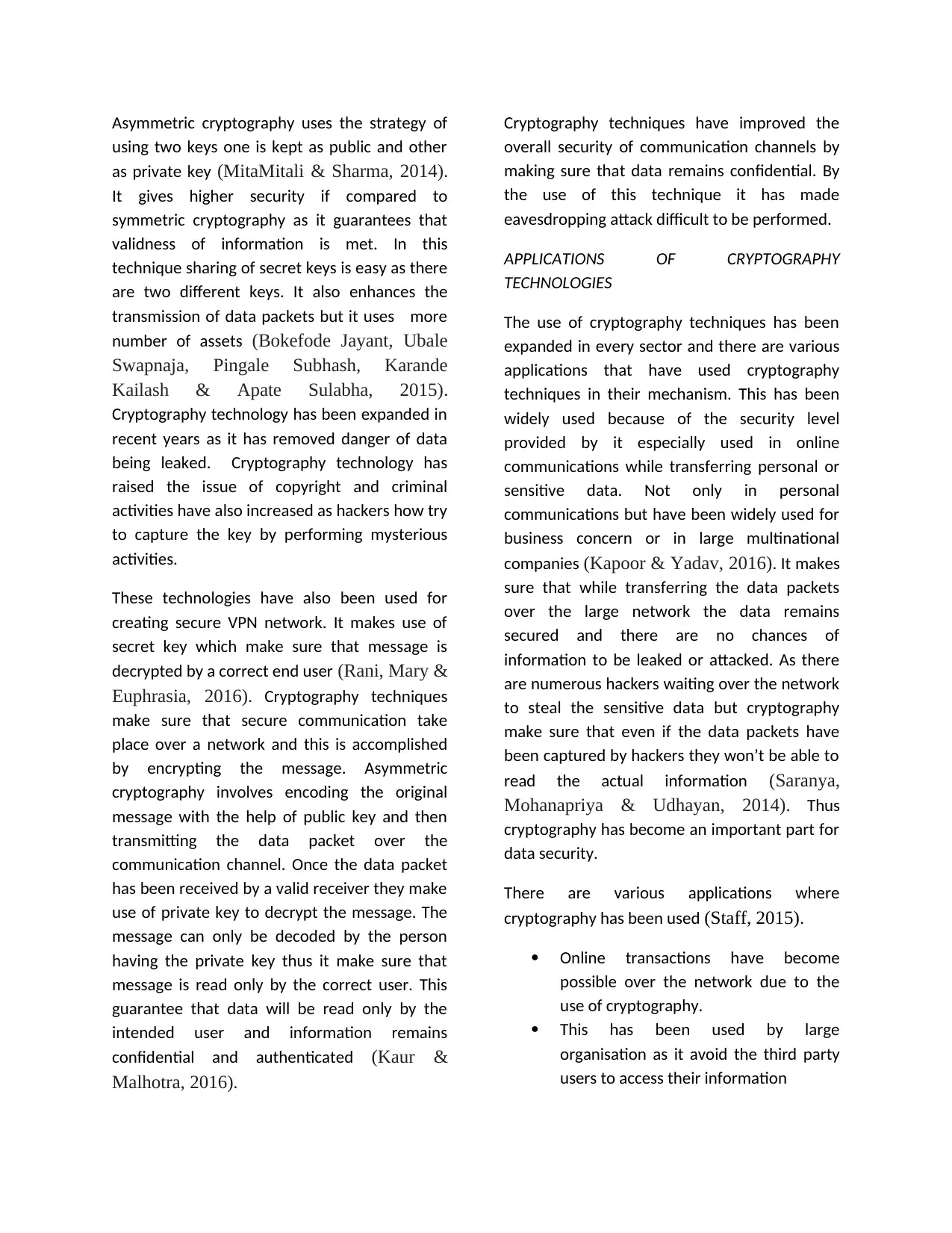
Asymmetric cryptography uses the strategy of
using two keys one is kept as public and other
as private key (MitaMitali & Sharma, 2014).
It gives higher security if compared to
symmetric cryptography as it guarantees that
validness of information is met. In this
technique sharing of secret keys is easy as there
are two different keys. It also enhances the
transmission of data packets but it uses more
number of assets (Bokefode Jayant, Ubale
Swapnaja, Pingale Subhash, Karande
Kailash & Apate Sulabha, 2015).
Cryptography technology has been expanded in
recent years as it has removed danger of data
being leaked. Cryptography technology has
raised the issue of copyright and criminal
activities have also increased as hackers how try
to capture the key by performing mysterious
activities.
These technologies have also been used for
creating secure VPN network. It makes use of
secret key which make sure that message is
decrypted by a correct end user (Rani, Mary &
Euphrasia, 2016). Cryptography techniques
make sure that secure communication take
place over a network and this is accomplished
by encrypting the message. Asymmetric
cryptography involves encoding the original
message with the help of public key and then
transmitting the data packet over the
communication channel. Once the data packet
has been received by a valid receiver they make
use of private key to decrypt the message. The
message can only be decoded by the person
having the private key thus it make sure that
message is read only by the correct user. This
guarantee that data will be read only by the
intended user and information remains
confidential and authenticated (Kaur &
Malhotra, 2016).
Cryptography techniques have improved the
overall security of communication channels by
making sure that data remains confidential. By
the use of this technique it has made
eavesdropping attack difficult to be performed.
APPLICATIONS OF CRYPTOGRAPHY
TECHNOLOGIES
The use of cryptography techniques has been
expanded in every sector and there are various
applications that have used cryptography
techniques in their mechanism. This has been
widely used because of the security level
provided by it especially used in online
communications while transferring personal or
sensitive data. Not only in personal
communications but have been widely used for
business concern or in large multinational
companies (Kapoor & Yadav, 2016). It makes
sure that while transferring the data packets
over the large network the data remains
secured and there are no chances of
information to be leaked or attacked. As there
are numerous hackers waiting over the network
to steal the sensitive data but cryptography
make sure that even if the data packets have
been captured by hackers they won’t be able to
read the actual information (Saranya,
Mohanapriya & Udhayan, 2014). Thus
cryptography has become an important part for
data security.
There are various applications where
cryptography has been used (Staff, 2015).
Online transactions have become
possible over the network due to the
use of cryptography.
This has been used by large
organisation as it avoid the third party
users to access their information
using two keys one is kept as public and other
as private key (MitaMitali & Sharma, 2014).
It gives higher security if compared to
symmetric cryptography as it guarantees that
validness of information is met. In this
technique sharing of secret keys is easy as there
are two different keys. It also enhances the
transmission of data packets but it uses more
number of assets (Bokefode Jayant, Ubale
Swapnaja, Pingale Subhash, Karande
Kailash & Apate Sulabha, 2015).
Cryptography technology has been expanded in
recent years as it has removed danger of data
being leaked. Cryptography technology has
raised the issue of copyright and criminal
activities have also increased as hackers how try
to capture the key by performing mysterious
activities.
These technologies have also been used for
creating secure VPN network. It makes use of
secret key which make sure that message is
decrypted by a correct end user (Rani, Mary &
Euphrasia, 2016). Cryptography techniques
make sure that secure communication take
place over a network and this is accomplished
by encrypting the message. Asymmetric
cryptography involves encoding the original
message with the help of public key and then
transmitting the data packet over the
communication channel. Once the data packet
has been received by a valid receiver they make
use of private key to decrypt the message. The
message can only be decoded by the person
having the private key thus it make sure that
message is read only by the correct user. This
guarantee that data will be read only by the
intended user and information remains
confidential and authenticated (Kaur &
Malhotra, 2016).
Cryptography techniques have improved the
overall security of communication channels by
making sure that data remains confidential. By
the use of this technique it has made
eavesdropping attack difficult to be performed.
APPLICATIONS OF CRYPTOGRAPHY
TECHNOLOGIES
The use of cryptography techniques has been
expanded in every sector and there are various
applications that have used cryptography
techniques in their mechanism. This has been
widely used because of the security level
provided by it especially used in online
communications while transferring personal or
sensitive data. Not only in personal
communications but have been widely used for
business concern or in large multinational
companies (Kapoor & Yadav, 2016). It makes
sure that while transferring the data packets
over the large network the data remains
secured and there are no chances of
information to be leaked or attacked. As there
are numerous hackers waiting over the network
to steal the sensitive data but cryptography
make sure that even if the data packets have
been captured by hackers they won’t be able to
read the actual information (Saranya,
Mohanapriya & Udhayan, 2014). Thus
cryptography has become an important part for
data security.
There are various applications where
cryptography has been used (Staff, 2015).
Online transactions have become
possible over the network due to the
use of cryptography.
This has been used by large
organisation as it avoid the third party
users to access their information
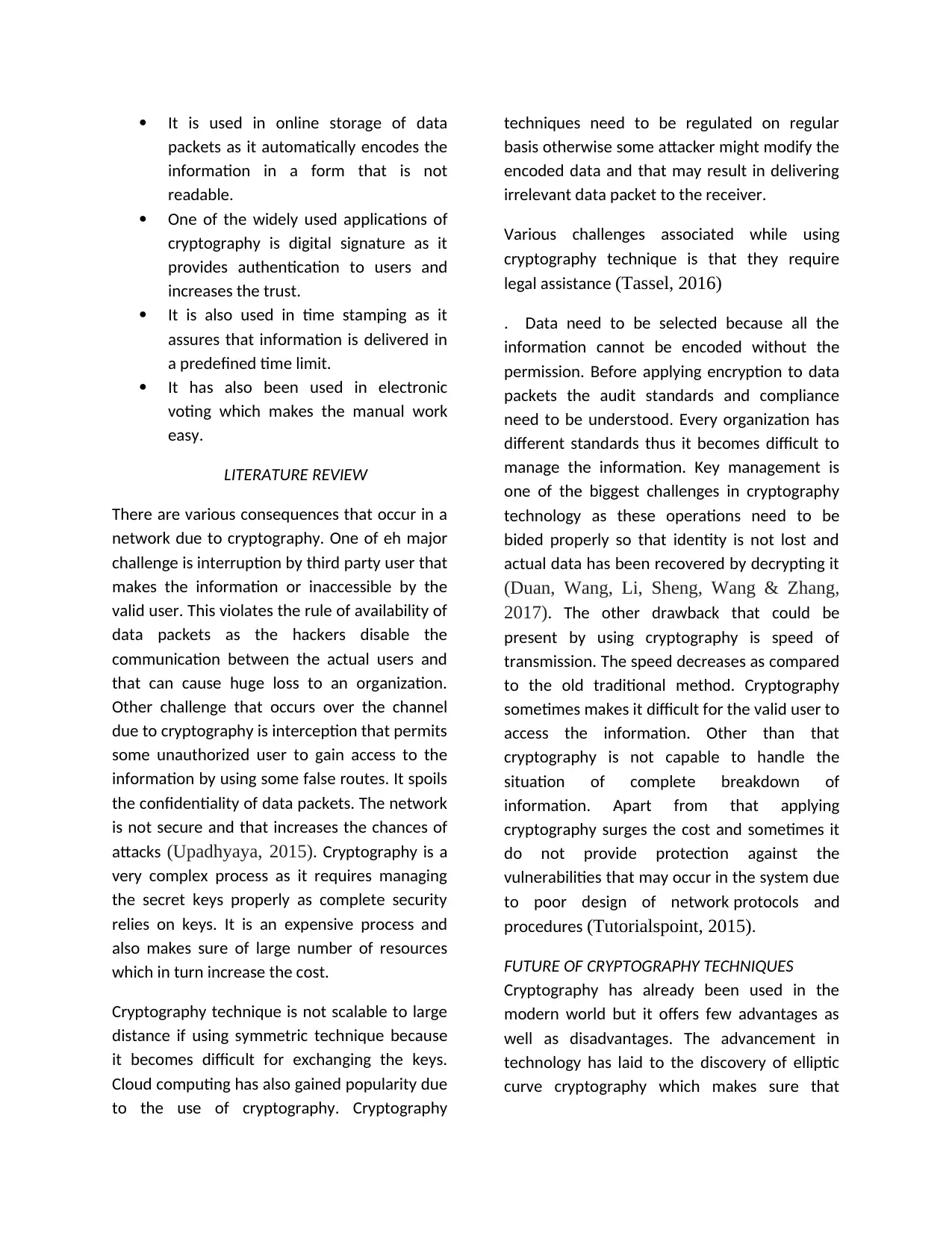
It is used in online storage of data
packets as it automatically encodes the
information in a form that is not
readable.
One of the widely used applications of
cryptography is digital signature as it
provides authentication to users and
increases the trust.
It is also used in time stamping as it
assures that information is delivered in
a predefined time limit.
It has also been used in electronic
voting which makes the manual work
easy.
LITERATURE REVIEW
There are various consequences that occur in a
network due to cryptography. One of eh major
challenge is interruption by third party user that
makes the information or inaccessible by the
valid user. This violates the rule of availability of
data packets as the hackers disable the
communication between the actual users and
that can cause huge loss to an organization.
Other challenge that occurs over the channel
due to cryptography is interception that permits
some unauthorized user to gain access to the
information by using some false routes. It spoils
the confidentiality of data packets. The network
is not secure and that increases the chances of
attacks (Upadhyaya, 2015). Cryptography is a
very complex process as it requires managing
the secret keys properly as complete security
relies on keys. It is an expensive process and
also makes sure of large number of resources
which in turn increase the cost.
Cryptography technique is not scalable to large
distance if using symmetric technique because
it becomes difficult for exchanging the keys.
Cloud computing has also gained popularity due
to the use of cryptography. Cryptography
techniques need to be regulated on regular
basis otherwise some attacker might modify the
encoded data and that may result in delivering
irrelevant data packet to the receiver.
Various challenges associated while using
cryptography technique is that they require
legal assistance (Tassel, 2016)
. Data need to be selected because all the
information cannot be encoded without the
permission. Before applying encryption to data
packets the audit standards and compliance
need to be understood. Every organization has
different standards thus it becomes difficult to
manage the information. Key management is
one of the biggest challenges in cryptography
technology as these operations need to be
bided properly so that identity is not lost and
actual data has been recovered by decrypting it
(Duan, Wang, Li, Sheng, Wang & Zhang,
2017). The other drawback that could be
present by using cryptography is speed of
transmission. The speed decreases as compared
to the old traditional method. Cryptography
sometimes makes it difficult for the valid user to
access the information. Other than that
cryptography is not capable to handle the
situation of complete breakdown of
information. Apart from that applying
cryptography surges the cost and sometimes it
do not provide protection against the
vulnerabilities that may occur in the system due
to poor design of network protocols and
procedures (Tutorialspoint, 2015).
FUTURE OF CRYPTOGRAPHY TECHNIQUES
Cryptography has already been used in the
modern world but it offers few advantages as
well as disadvantages. The advancement in
technology has laid to the discovery of elliptic
curve cryptography which makes sure that
packets as it automatically encodes the
information in a form that is not
readable.
One of the widely used applications of
cryptography is digital signature as it
provides authentication to users and
increases the trust.
It is also used in time stamping as it
assures that information is delivered in
a predefined time limit.
It has also been used in electronic
voting which makes the manual work
easy.
LITERATURE REVIEW
There are various consequences that occur in a
network due to cryptography. One of eh major
challenge is interruption by third party user that
makes the information or inaccessible by the
valid user. This violates the rule of availability of
data packets as the hackers disable the
communication between the actual users and
that can cause huge loss to an organization.
Other challenge that occurs over the channel
due to cryptography is interception that permits
some unauthorized user to gain access to the
information by using some false routes. It spoils
the confidentiality of data packets. The network
is not secure and that increases the chances of
attacks (Upadhyaya, 2015). Cryptography is a
very complex process as it requires managing
the secret keys properly as complete security
relies on keys. It is an expensive process and
also makes sure of large number of resources
which in turn increase the cost.
Cryptography technique is not scalable to large
distance if using symmetric technique because
it becomes difficult for exchanging the keys.
Cloud computing has also gained popularity due
to the use of cryptography. Cryptography
techniques need to be regulated on regular
basis otherwise some attacker might modify the
encoded data and that may result in delivering
irrelevant data packet to the receiver.
Various challenges associated while using
cryptography technique is that they require
legal assistance (Tassel, 2016)
. Data need to be selected because all the
information cannot be encoded without the
permission. Before applying encryption to data
packets the audit standards and compliance
need to be understood. Every organization has
different standards thus it becomes difficult to
manage the information. Key management is
one of the biggest challenges in cryptography
technology as these operations need to be
bided properly so that identity is not lost and
actual data has been recovered by decrypting it
(Duan, Wang, Li, Sheng, Wang & Zhang,
2017). The other drawback that could be
present by using cryptography is speed of
transmission. The speed decreases as compared
to the old traditional method. Cryptography
sometimes makes it difficult for the valid user to
access the information. Other than that
cryptography is not capable to handle the
situation of complete breakdown of
information. Apart from that applying
cryptography surges the cost and sometimes it
do not provide protection against the
vulnerabilities that may occur in the system due
to poor design of network protocols and
procedures (Tutorialspoint, 2015).
FUTURE OF CRYPTOGRAPHY TECHNIQUES
Cryptography has already been used in the
modern world but it offers few advantages as
well as disadvantages. The advancement in
technology has laid to the discovery of elliptic
curve cryptography which makes sure that
⊘ This is a preview!⊘
Do you want full access?
Subscribe today to unlock all pages.

Trusted by 1+ million students worldwide
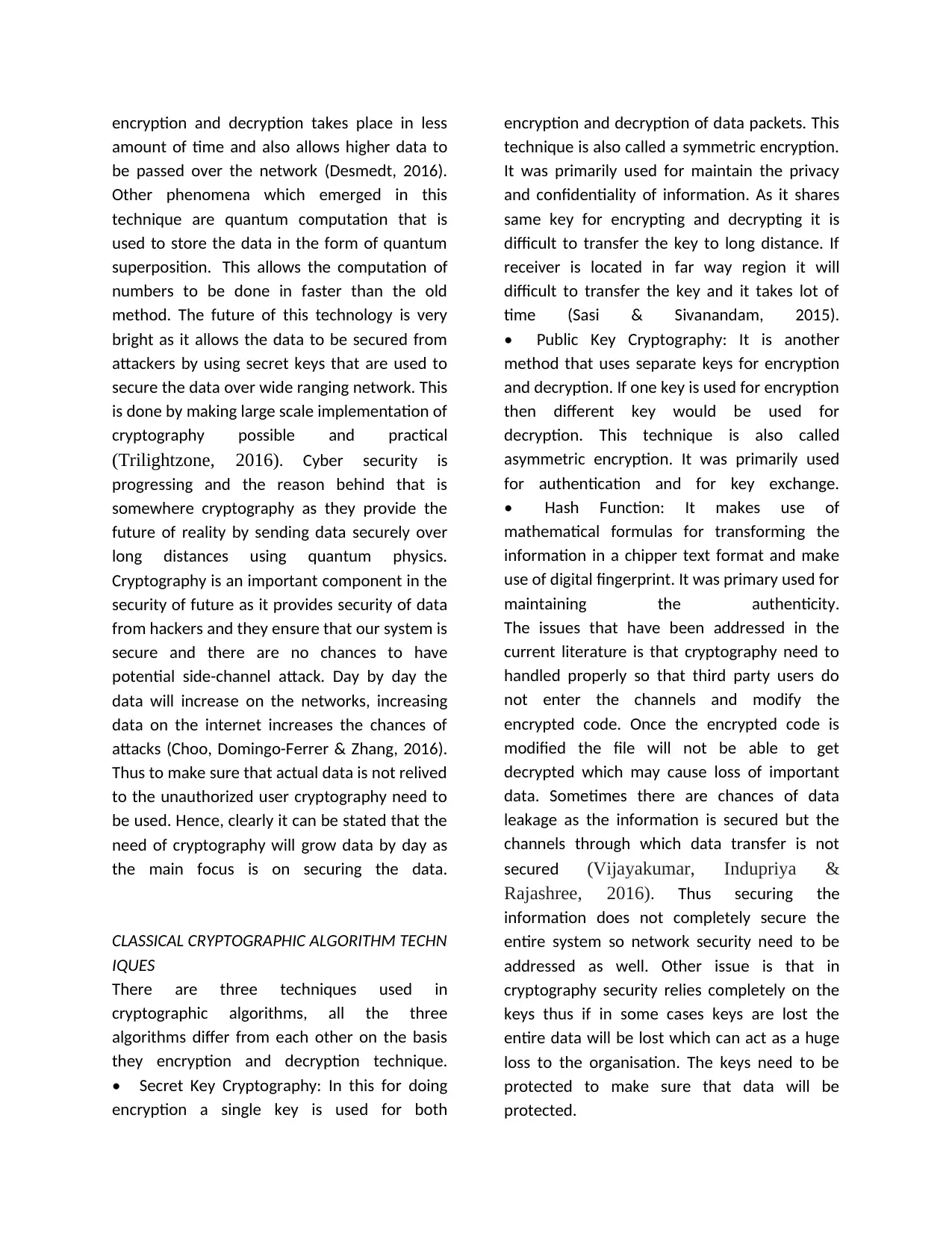
encryption and decryption takes place in less
amount of time and also allows higher data to
be passed over the network (Desmedt, 2016).
Other phenomena which emerged in this
technique are quantum computation that is
used to store the data in the form of quantum
superposition. This allows the computation of
numbers to be done in faster than the old
method. The future of this technology is very
bright as it allows the data to be secured from
attackers by using secret keys that are used to
secure the data over wide ranging network. This
is done by making large scale implementation of
cryptography possible and practical
(Trilightzone, 2016). Cyber security is
progressing and the reason behind that is
somewhere cryptography as they provide the
future of reality by sending data securely over
long distances using quantum physics.
Cryptography is an important component in the
security of future as it provides security of data
from hackers and they ensure that our system is
secure and there are no chances to have
potential side-channel attack. Day by day the
data will increase on the networks, increasing
data on the internet increases the chances of
attacks (Choo, Domingo-Ferrer & Zhang, 2016).
Thus to make sure that actual data is not relived
to the unauthorized user cryptography need to
be used. Hence, clearly it can be stated that the
need of cryptography will grow data by day as
the main focus is on securing the data.
CLASSICAL CRYPTOGRAPHIC ALGORITHM TECHN
IQUES
There are three techniques used in
cryptographic algorithms, all the three
algorithms differ from each other on the basis
they encryption and decryption technique.
• Secret Key Cryptography: In this for doing
encryption a single key is used for both
encryption and decryption of data packets. This
technique is also called a symmetric encryption.
It was primarily used for maintain the privacy
and confidentiality of information. As it shares
same key for encrypting and decrypting it is
difficult to transfer the key to long distance. If
receiver is located in far way region it will
difficult to transfer the key and it takes lot of
time (Sasi & Sivanandam, 2015).
• Public Key Cryptography: It is another
method that uses separate keys for encryption
and decryption. If one key is used for encryption
then different key would be used for
decryption. This technique is also called
asymmetric encryption. It was primarily used
for authentication and for key exchange.
• Hash Function: It makes use of
mathematical formulas for transforming the
information in a chipper text format and make
use of digital fingerprint. It was primary used for
maintaining the authenticity.
The issues that have been addressed in the
current literature is that cryptography need to
handled properly so that third party users do
not enter the channels and modify the
encrypted code. Once the encrypted code is
modified the file will not be able to get
decrypted which may cause loss of important
data. Sometimes there are chances of data
leakage as the information is secured but the
channels through which data transfer is not
secured (Vijayakumar, Indupriya &
Rajashree, 2016). Thus securing the
information does not completely secure the
entire system so network security need to be
addressed as well. Other issue is that in
cryptography security relies completely on the
keys thus if in some cases keys are lost the
entire data will be lost which can act as a huge
loss to the organisation. The keys need to be
protected to make sure that data will be
protected.
amount of time and also allows higher data to
be passed over the network (Desmedt, 2016).
Other phenomena which emerged in this
technique are quantum computation that is
used to store the data in the form of quantum
superposition. This allows the computation of
numbers to be done in faster than the old
method. The future of this technology is very
bright as it allows the data to be secured from
attackers by using secret keys that are used to
secure the data over wide ranging network. This
is done by making large scale implementation of
cryptography possible and practical
(Trilightzone, 2016). Cyber security is
progressing and the reason behind that is
somewhere cryptography as they provide the
future of reality by sending data securely over
long distances using quantum physics.
Cryptography is an important component in the
security of future as it provides security of data
from hackers and they ensure that our system is
secure and there are no chances to have
potential side-channel attack. Day by day the
data will increase on the networks, increasing
data on the internet increases the chances of
attacks (Choo, Domingo-Ferrer & Zhang, 2016).
Thus to make sure that actual data is not relived
to the unauthorized user cryptography need to
be used. Hence, clearly it can be stated that the
need of cryptography will grow data by day as
the main focus is on securing the data.
CLASSICAL CRYPTOGRAPHIC ALGORITHM TECHN
IQUES
There are three techniques used in
cryptographic algorithms, all the three
algorithms differ from each other on the basis
they encryption and decryption technique.
• Secret Key Cryptography: In this for doing
encryption a single key is used for both
encryption and decryption of data packets. This
technique is also called a symmetric encryption.
It was primarily used for maintain the privacy
and confidentiality of information. As it shares
same key for encrypting and decrypting it is
difficult to transfer the key to long distance. If
receiver is located in far way region it will
difficult to transfer the key and it takes lot of
time (Sasi & Sivanandam, 2015).
• Public Key Cryptography: It is another
method that uses separate keys for encryption
and decryption. If one key is used for encryption
then different key would be used for
decryption. This technique is also called
asymmetric encryption. It was primarily used
for authentication and for key exchange.
• Hash Function: It makes use of
mathematical formulas for transforming the
information in a chipper text format and make
use of digital fingerprint. It was primary used for
maintaining the authenticity.
The issues that have been addressed in the
current literature is that cryptography need to
handled properly so that third party users do
not enter the channels and modify the
encrypted code. Once the encrypted code is
modified the file will not be able to get
decrypted which may cause loss of important
data. Sometimes there are chances of data
leakage as the information is secured but the
channels through which data transfer is not
secured (Vijayakumar, Indupriya &
Rajashree, 2016). Thus securing the
information does not completely secure the
entire system so network security need to be
addressed as well. Other issue is that in
cryptography security relies completely on the
keys thus if in some cases keys are lost the
entire data will be lost which can act as a huge
loss to the organisation. The keys need to be
protected to make sure that data will be
protected.
Paraphrase This Document
Need a fresh take? Get an instant paraphrase of this document with our AI Paraphraser
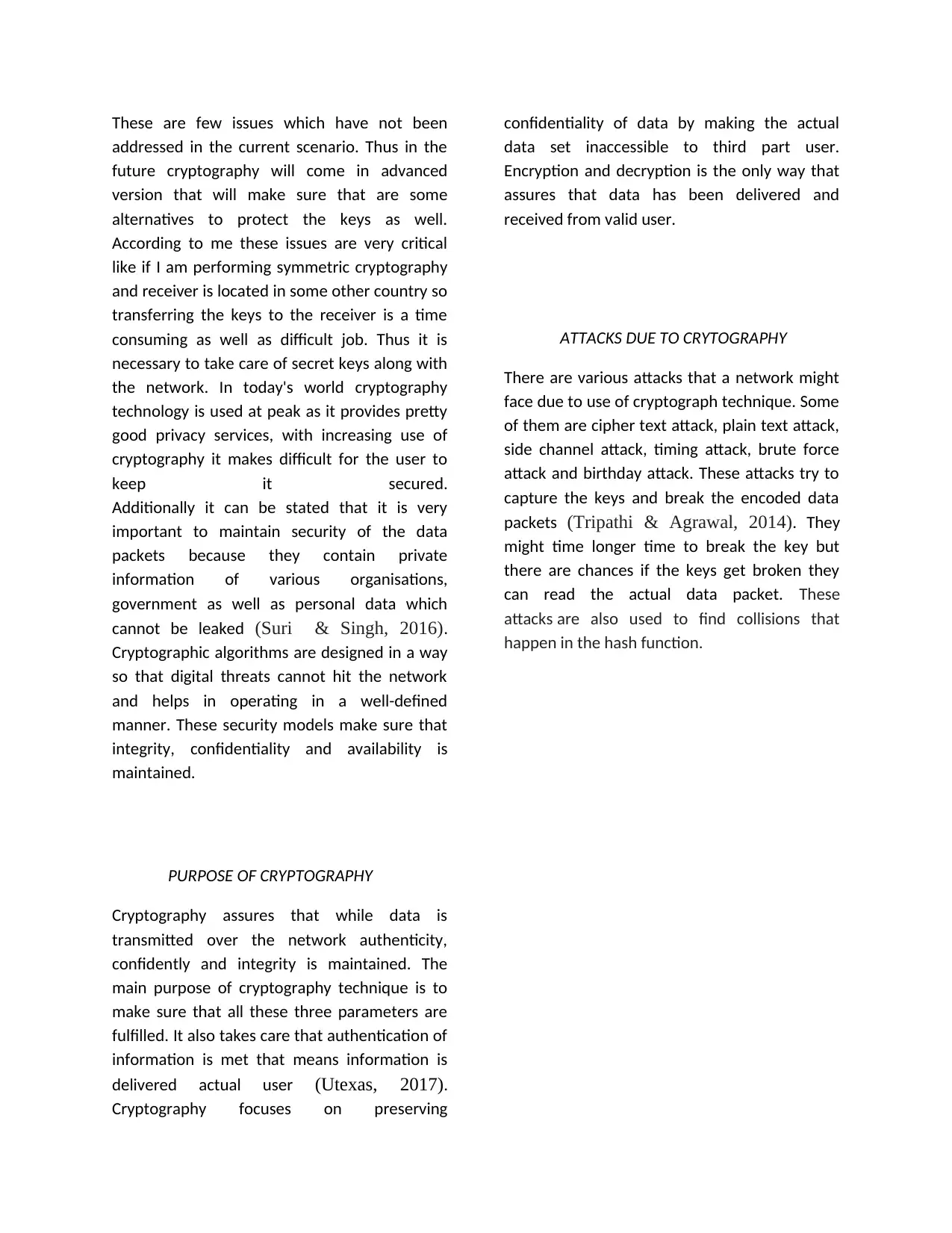
These are few issues which have not been
addressed in the current scenario. Thus in the
future cryptography will come in advanced
version that will make sure that are some
alternatives to protect the keys as well.
According to me these issues are very critical
like if I am performing symmetric cryptography
and receiver is located in some other country so
transferring the keys to the receiver is a time
consuming as well as difficult job. Thus it is
necessary to take care of secret keys along with
the network. In today's world cryptography
technology is used at peak as it provides pretty
good privacy services, with increasing use of
cryptography it makes difficult for the user to
keep it secured.
Additionally it can be stated that it is very
important to maintain security of the data
packets because they contain private
information of various organisations,
government as well as personal data which
cannot be leaked (Suri & Singh, 2016).
Cryptographic algorithms are designed in a way
so that digital threats cannot hit the network
and helps in operating in a well-defined
manner. These security models make sure that
integrity, confidentiality and availability is
maintained.
PURPOSE OF CRYPTOGRAPHY
Cryptography assures that while data is
transmitted over the network authenticity,
confidently and integrity is maintained. The
main purpose of cryptography technique is to
make sure that all these three parameters are
fulfilled. It also takes care that authentication of
information is met that means information is
delivered actual user (Utexas, 2017).
Cryptography focuses on preserving
confidentiality of data by making the actual
data set inaccessible to third part user.
Encryption and decryption is the only way that
assures that data has been delivered and
received from valid user.
ATTACKS DUE TO CRYTOGRAPHY
There are various attacks that a network might
face due to use of cryptograph technique. Some
of them are cipher text attack, plain text attack,
side channel attack, timing attack, brute force
attack and birthday attack. These attacks try to
capture the keys and break the encoded data
packets (Tripathi & Agrawal, 2014). They
might time longer time to break the key but
there are chances if the keys get broken they
can read the actual data packet. These
attacks are also used to find collisions that
happen in the hash function.
addressed in the current scenario. Thus in the
future cryptography will come in advanced
version that will make sure that are some
alternatives to protect the keys as well.
According to me these issues are very critical
like if I am performing symmetric cryptography
and receiver is located in some other country so
transferring the keys to the receiver is a time
consuming as well as difficult job. Thus it is
necessary to take care of secret keys along with
the network. In today's world cryptography
technology is used at peak as it provides pretty
good privacy services, with increasing use of
cryptography it makes difficult for the user to
keep it secured.
Additionally it can be stated that it is very
important to maintain security of the data
packets because they contain private
information of various organisations,
government as well as personal data which
cannot be leaked (Suri & Singh, 2016).
Cryptographic algorithms are designed in a way
so that digital threats cannot hit the network
and helps in operating in a well-defined
manner. These security models make sure that
integrity, confidentiality and availability is
maintained.
PURPOSE OF CRYPTOGRAPHY
Cryptography assures that while data is
transmitted over the network authenticity,
confidently and integrity is maintained. The
main purpose of cryptography technique is to
make sure that all these three parameters are
fulfilled. It also takes care that authentication of
information is met that means information is
delivered actual user (Utexas, 2017).
Cryptography focuses on preserving
confidentiality of data by making the actual
data set inaccessible to third part user.
Encryption and decryption is the only way that
assures that data has been delivered and
received from valid user.
ATTACKS DUE TO CRYTOGRAPHY
There are various attacks that a network might
face due to use of cryptograph technique. Some
of them are cipher text attack, plain text attack,
side channel attack, timing attack, brute force
attack and birthday attack. These attacks try to
capture the keys and break the encoded data
packets (Tripathi & Agrawal, 2014). They
might time longer time to break the key but
there are chances if the keys get broken they
can read the actual data packet. These
attacks are also used to find collisions that
happen in the hash function.
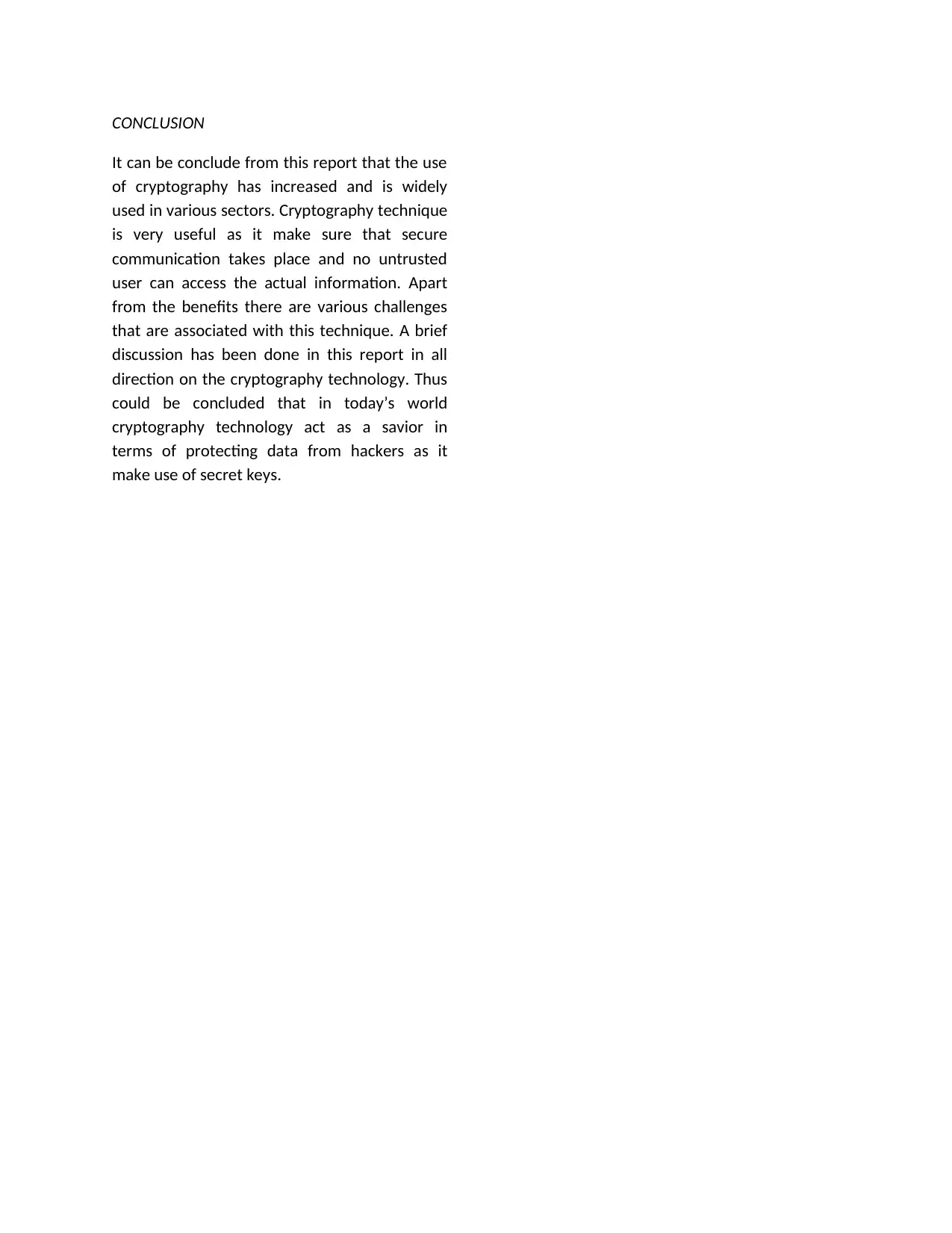
CONCLUSION
It can be conclude from this report that the use
of cryptography has increased and is widely
used in various sectors. Cryptography technique
is very useful as it make sure that secure
communication takes place and no untrusted
user can access the actual information. Apart
from the benefits there are various challenges
that are associated with this technique. A brief
discussion has been done in this report in all
direction on the cryptography technology. Thus
could be concluded that in today’s world
cryptography technology act as a savior in
terms of protecting data from hackers as it
make use of secret keys.
It can be conclude from this report that the use
of cryptography has increased and is widely
used in various sectors. Cryptography technique
is very useful as it make sure that secure
communication takes place and no untrusted
user can access the actual information. Apart
from the benefits there are various challenges
that are associated with this technique. A brief
discussion has been done in this report in all
direction on the cryptography technology. Thus
could be concluded that in today’s world
cryptography technology act as a savior in
terms of protecting data from hackers as it
make use of secret keys.
⊘ This is a preview!⊘
Do you want full access?
Subscribe today to unlock all pages.

Trusted by 1+ million students worldwide
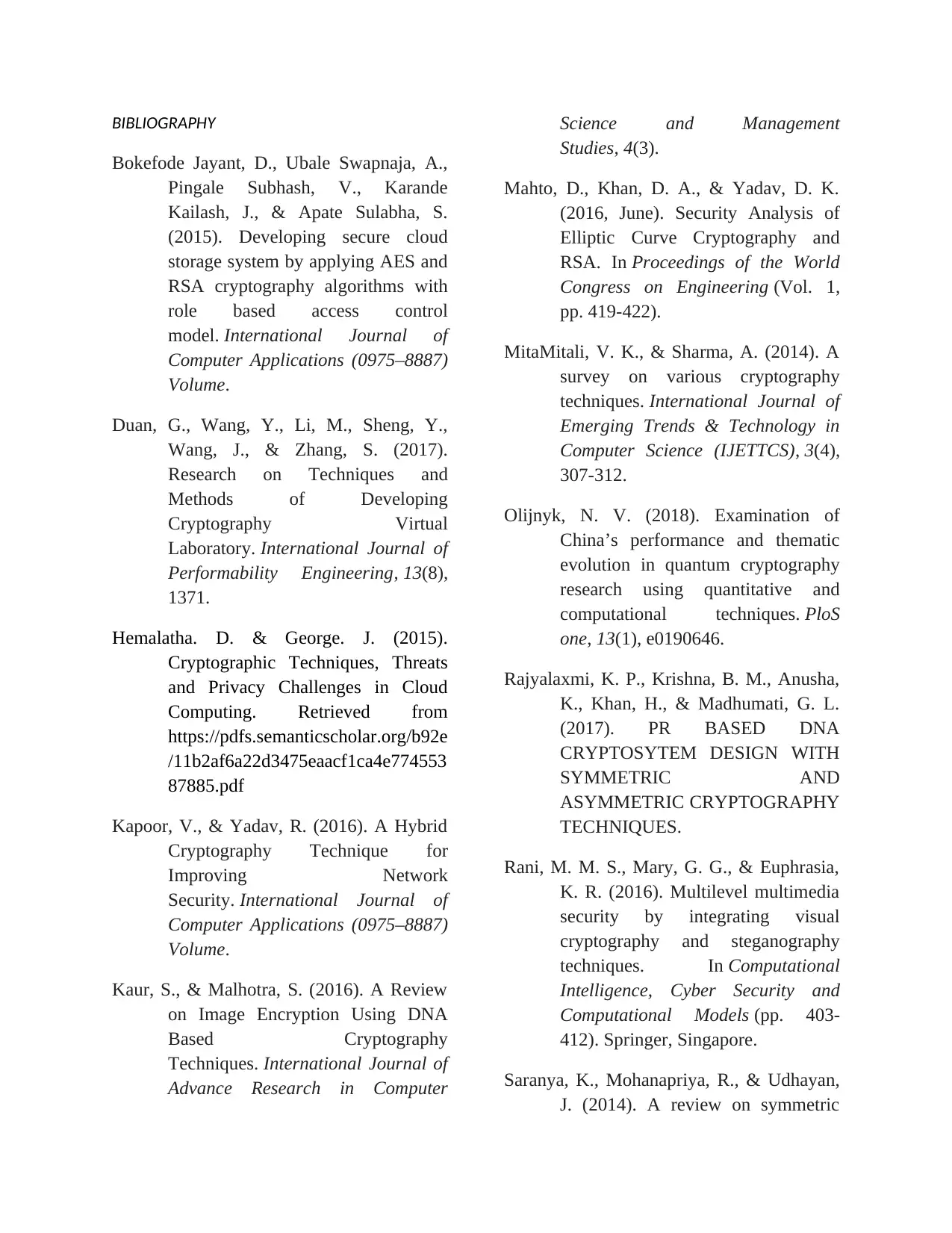
BIBLIOGRAPHY
Bokefode Jayant, D., Ubale Swapnaja, A.,
Pingale Subhash, V., Karande
Kailash, J., & Apate Sulabha, S.
(2015). Developing secure cloud
storage system by applying AES and
RSA cryptography algorithms with
role based access control
model. International Journal of
Computer Applications (0975–8887)
Volume.
Duan, G., Wang, Y., Li, M., Sheng, Y.,
Wang, J., & Zhang, S. (2017).
Research on Techniques and
Methods of Developing
Cryptography Virtual
Laboratory. International Journal of
Performability Engineering, 13(8),
1371.
Hemalatha. D. & George. J. (2015).
Cryptographic Techniques, Threats
and Privacy Challenges in Cloud
Computing. Retrieved from
https://pdfs.semanticscholar.org/b92e
/11b2af6a22d3475eaacf1ca4e774553
87885.pdf
Kapoor, V., & Yadav, R. (2016). A Hybrid
Cryptography Technique for
Improving Network
Security. International Journal of
Computer Applications (0975–8887)
Volume.
Kaur, S., & Malhotra, S. (2016). A Review
on Image Encryption Using DNA
Based Cryptography
Techniques. International Journal of
Advance Research in Computer
Science and Management
Studies, 4(3).
Mahto, D., Khan, D. A., & Yadav, D. K.
(2016, June). Security Analysis of
Elliptic Curve Cryptography and
RSA. In Proceedings of the World
Congress on Engineering (Vol. 1,
pp. 419-422).
MitaMitali, V. K., & Sharma, A. (2014). A
survey on various cryptography
techniques. International Journal of
Emerging Trends & Technology in
Computer Science (IJETTCS), 3(4),
307-312.
Olijnyk, N. V. (2018). Examination of
China’s performance and thematic
evolution in quantum cryptography
research using quantitative and
computational techniques. PloS
one, 13(1), e0190646.
Rajyalaxmi, K. P., Krishna, B. M., Anusha,
K., Khan, H., & Madhumati, G. L.
(2017). PR BASED DNA
CRYPTOSYTEM DESIGN WITH
SYMMETRIC AND
ASYMMETRIC CRYPTOGRAPHY
TECHNIQUES.
Rani, M. M. S., Mary, G. G., & Euphrasia,
K. R. (2016). Multilevel multimedia
security by integrating visual
cryptography and steganography
techniques. In Computational
Intelligence, Cyber Security and
Computational Models (pp. 403-
412). Springer, Singapore.
Saranya, K., Mohanapriya, R., & Udhayan,
J. (2014). A review on symmetric
Bokefode Jayant, D., Ubale Swapnaja, A.,
Pingale Subhash, V., Karande
Kailash, J., & Apate Sulabha, S.
(2015). Developing secure cloud
storage system by applying AES and
RSA cryptography algorithms with
role based access control
model. International Journal of
Computer Applications (0975–8887)
Volume.
Duan, G., Wang, Y., Li, M., Sheng, Y.,
Wang, J., & Zhang, S. (2017).
Research on Techniques and
Methods of Developing
Cryptography Virtual
Laboratory. International Journal of
Performability Engineering, 13(8),
1371.
Hemalatha. D. & George. J. (2015).
Cryptographic Techniques, Threats
and Privacy Challenges in Cloud
Computing. Retrieved from
https://pdfs.semanticscholar.org/b92e
/11b2af6a22d3475eaacf1ca4e774553
87885.pdf
Kapoor, V., & Yadav, R. (2016). A Hybrid
Cryptography Technique for
Improving Network
Security. International Journal of
Computer Applications (0975–8887)
Volume.
Kaur, S., & Malhotra, S. (2016). A Review
on Image Encryption Using DNA
Based Cryptography
Techniques. International Journal of
Advance Research in Computer
Science and Management
Studies, 4(3).
Mahto, D., Khan, D. A., & Yadav, D. K.
(2016, June). Security Analysis of
Elliptic Curve Cryptography and
RSA. In Proceedings of the World
Congress on Engineering (Vol. 1,
pp. 419-422).
MitaMitali, V. K., & Sharma, A. (2014). A
survey on various cryptography
techniques. International Journal of
Emerging Trends & Technology in
Computer Science (IJETTCS), 3(4),
307-312.
Olijnyk, N. V. (2018). Examination of
China’s performance and thematic
evolution in quantum cryptography
research using quantitative and
computational techniques. PloS
one, 13(1), e0190646.
Rajyalaxmi, K. P., Krishna, B. M., Anusha,
K., Khan, H., & Madhumati, G. L.
(2017). PR BASED DNA
CRYPTOSYTEM DESIGN WITH
SYMMETRIC AND
ASYMMETRIC CRYPTOGRAPHY
TECHNIQUES.
Rani, M. M. S., Mary, G. G., & Euphrasia,
K. R. (2016). Multilevel multimedia
security by integrating visual
cryptography and steganography
techniques. In Computational
Intelligence, Cyber Security and
Computational Models (pp. 403-
412). Springer, Singapore.
Saranya, K., Mohanapriya, R., & Udhayan,
J. (2014). A review on symmetric
Paraphrase This Document
Need a fresh take? Get an instant paraphrase of this document with our AI Paraphraser
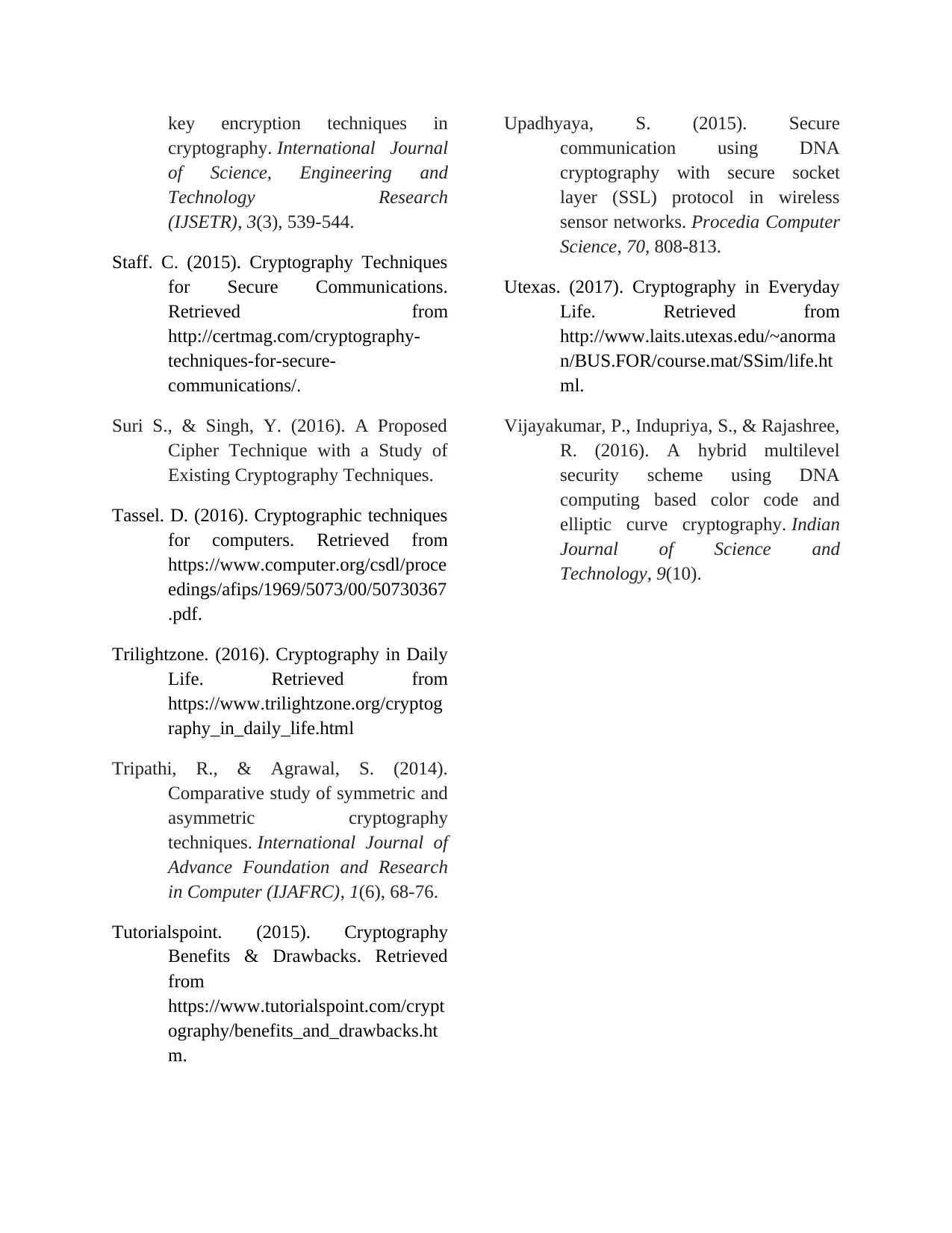
key encryption techniques in
cryptography. International Journal
of Science, Engineering and
Technology Research
(IJSETR), 3(3), 539-544.
Staff. C. (2015). Cryptography Techniques
for Secure Communications.
Retrieved from
http://certmag.com/cryptography-
techniques-for-secure-
communications/.
Suri S., & Singh, Y. (2016). A Proposed
Cipher Technique with a Study of
Existing Cryptography Techniques.
Tassel. D. (2016). Cryptographic techniques
for computers. Retrieved from
https://www.computer.org/csdl/proce
edings/afips/1969/5073/00/50730367
.pdf.
Trilightzone. (2016). Cryptography in Daily
Life. Retrieved from
https://www.trilightzone.org/cryptog
raphy_in_daily_life.html
Tripathi, R., & Agrawal, S. (2014).
Comparative study of symmetric and
asymmetric cryptography
techniques. International Journal of
Advance Foundation and Research
in Computer (IJAFRC), 1(6), 68-76.
Tutorialspoint. (2015). Cryptography
Benefits & Drawbacks. Retrieved
from
https://www.tutorialspoint.com/crypt
ography/benefits_and_drawbacks.ht
m.
Upadhyaya, S. (2015). Secure
communication using DNA
cryptography with secure socket
layer (SSL) protocol in wireless
sensor networks. Procedia Computer
Science, 70, 808-813.
Utexas. (2017). Cryptography in Everyday
Life. Retrieved from
http://www.laits.utexas.edu/~anorma
n/BUS.FOR/course.mat/SSim/life.ht
ml.
Vijayakumar, P., Indupriya, S., & Rajashree,
R. (2016). A hybrid multilevel
security scheme using DNA
computing based color code and
elliptic curve cryptography. Indian
Journal of Science and
Technology, 9(10).
cryptography. International Journal
of Science, Engineering and
Technology Research
(IJSETR), 3(3), 539-544.
Staff. C. (2015). Cryptography Techniques
for Secure Communications.
Retrieved from
http://certmag.com/cryptography-
techniques-for-secure-
communications/.
Suri S., & Singh, Y. (2016). A Proposed
Cipher Technique with a Study of
Existing Cryptography Techniques.
Tassel. D. (2016). Cryptographic techniques
for computers. Retrieved from
https://www.computer.org/csdl/proce
edings/afips/1969/5073/00/50730367
.pdf.
Trilightzone. (2016). Cryptography in Daily
Life. Retrieved from
https://www.trilightzone.org/cryptog
raphy_in_daily_life.html
Tripathi, R., & Agrawal, S. (2014).
Comparative study of symmetric and
asymmetric cryptography
techniques. International Journal of
Advance Foundation and Research
in Computer (IJAFRC), 1(6), 68-76.
Tutorialspoint. (2015). Cryptography
Benefits & Drawbacks. Retrieved
from
https://www.tutorialspoint.com/crypt
ography/benefits_and_drawbacks.ht
m.
Upadhyaya, S. (2015). Secure
communication using DNA
cryptography with secure socket
layer (SSL) protocol in wireless
sensor networks. Procedia Computer
Science, 70, 808-813.
Utexas. (2017). Cryptography in Everyday
Life. Retrieved from
http://www.laits.utexas.edu/~anorma
n/BUS.FOR/course.mat/SSim/life.ht
ml.
Vijayakumar, P., Indupriya, S., & Rajashree,
R. (2016). A hybrid multilevel
security scheme using DNA
computing based color code and
elliptic curve cryptography. Indian
Journal of Science and
Technology, 9(10).
1 out of 8
Related Documents
Your All-in-One AI-Powered Toolkit for Academic Success.
+13062052269
info@desklib.com
Available 24*7 on WhatsApp / Email
![[object Object]](/_next/static/media/star-bottom.7253800d.svg)
Unlock your academic potential
Copyright © 2020–2026 A2Z Services. All Rights Reserved. Developed and managed by ZUCOL.





